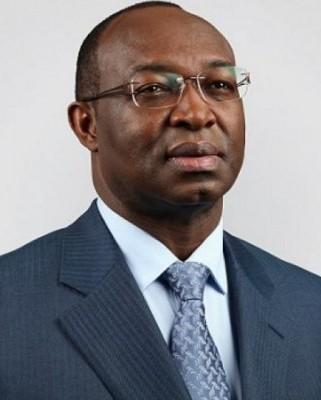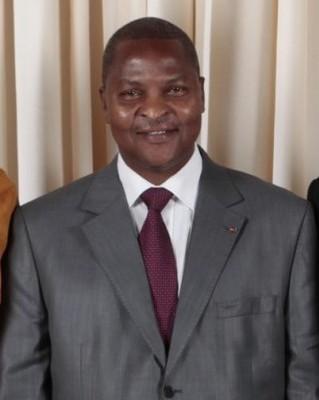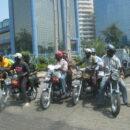The Central African Republic’s Presidential Run-Off: Mr Clean vs. The Prof

The CAR’s run-off will determine much more than just who gets the keys to the presidential office.
The Central Africa Republic’s (CAR) presidential run-off, scheduled to be held on 14 February, looks set to be the country’s most tightly-contested election to date. After no single candidate emerged with a majority in the first round in December 2015, voters will go to the polls again this Sunday to choose between two former prime ministers: Anicet-Georges Dologuélé (left) and Faustin Archange Touadéra (right).
The race is currently too close to call, and whichever candidate emerges victorious will have a whole host of gruelling challenges to overcome once in office. However, the choice the electorate makes could also have much wider implications. Powerful figures and factions have been manoeuvring behind the scenes of both nominees’ campaigns, and the way the contest pans out is likely to determine far more than just who gets the keys to the presidential office.
Anicet-Georges Dologuélé: Mr Clean?
Dologuélé, a wealthy businessman who served as prime minister from 1999-2001 under former President Ange-Félix Patassé, led the first round with 23.7 %. According to a breakdown of the results, he was able to garner some support in most areas of the country and won a majority in Ouham-Pendé, the home region of ousted President François Bozizé.
Bozizé had wanted to run in the elections himself, but was banned due to allegations of human rights allegations. Currently living in exile, the former president is being investigated by the International Criminal Court (ICC) and CAR authorities for crimes against humanity committed during his ten-year presidency from 2003-2013 as well as during the conflict after his overthrow in March 2013. More than 5,000 people are thought have been killed in the aftermath of his overthrow when months of anarchy turned into a sectarian battle between the northern-based Séléka rebel alliance that had deposed Bozizé and anti-balaka vigilantes, elements of which were backed by the ousted president.
CAR’s transition government has co-operated with the ICC and, in addition, ensured Bozizé was disqualified from running in elections because of the local arrest warrant issued against him. However, that has not meant his influence is fully stymied, and the former president and his Kwa na Kwa party (KnK) have given Dologuélé and his Union for Central Africa’s Renewal (URCA) their full backing. In fact, in December, the influential KnK and URCA went as far as to sign a political agreement laying out the terms of their alliance. This deal stipulates that in return for KnK’s support, a victorious Dologuélé will offer some seats in government to members of KnK and could see him grant Bozizé amnesty.
This agreement has raised eyebrows, but it doesn’t seem to have dented Dologuélé’s appeal amongst the electorate or other potential allies such as former presidential candidates. For instance, Sylvain Patassé, son of the late President Patassé and first-round contender, has expressed his support for Dologuélé. Meanwhile Desiré Kolingba, another defeated challenger and son of the late President André Kolingba, also appears to back the frontrunner.
Under the slogan “United We Will Win”, Dologuélé has run a well-funded campaign. He is popularly known as ‘AGD’ or alternatively as ‘Mr Clean’ due to his anti-corruption activities when prime minister, although it is notable that he was fired over allegations of graft himself when he was head of the regional development bank, BDEAC.
In his campaign, Dologuélé has preached reconciliation and promised voters a break from a cycle of coups and conflict, but his alliance with Bozizé remains deeply troubling and could undermine this pledge. A win for the experienced technocrat Mr Clean may have its benefits for the country, but it could also have very worrying implications for justice and reconciliation in a country experiencing a very precarious peace.
Faustin Archange Touadéra: the outsider?
Coming second in the first round with 19%, Touadéra’s campaign is fraught with contradictions too. He is running as an independent under the slogan “I am committed to peace” and as the alternative to the Bozizé-backed Dologuélé, yet he also has close links to the former president.
In many ways, Touadéra owes his whole political career to Bozizé, who appointed him prime minister in 2008, and to the KnK, which he once served as vice-president. He has since broken away from the party – a move the KnK saw as a betrayal – but retains significant support from some grassroots members who have backed his bid despite the party’s official pro-Dologuélé stance.
A former Maths Professor and Vice Chancellor of the University of Bangui, Touadéra’s appointment as prime minister eight years ago came as a surprise to most. Bozizé reportedly appointed him partly as an attempt to appease striking teachers and lecturers demanding overdue salaries. These disputes weren’t resolved, but Touadéra worked closely with Bozizé for five years through further labour strikes and conflicts.
As the last prime minister before Bozizé was toppled, Touadéra was set to succeed his former boss under the Libreville Agreement of 2013. Signed between the Bozizé government and rebel Séléka alliance, the pact halted the rebels’ march towards Bangui and created a short-lived coalition government. The peace deal collapsed before long, but some factions of the former Séléka alliance still cite it to claim the current transition government is illegitimate.
More recently, some factions may have also turned to using the agreement to show active support for Touadéra’s candidacy. Indeed, somewhat surprisingly last week, General Mohammed Moussa Dhaffane, the leader of the splinter group la Séléka Rénovée pour la Justice et la Paix and one-time minister in the Séléka government, publicly endorsed Touadéra. The presidential hopeful has yet to respond to this unexpected backing, though Dhaffane’s motivations for offering his support could be more about self-publicity than any particular affinity with the presidential candidate.
Among his supporters, Touadéra is seen as a unifier who can traverse the CAR’s Christian-Muslim divide and his rallies in downtown Bangui have been attended by both ex-Séléka and former anti-balaka members. However, unlike Dologuélé who has the support of the KnK and URCA, Touadéra does not have the backing of any political party and his campaign lags far behind in terms of financial resources and reach. Nevertheless, after the dark horse surprised most observers by coming second in the first round, it may be foolish to discount Touadéra’s chances too soon.
A new chapter?
Both of CAR’s presidential finalists are formidable figures who, in theory, have the experience necessary to set the country on the path to stability, but the country’s politics of patronage casts a long shadow over this potential. Concerns over governance, peace and justice weigh particularly heavily on this close election and raise many questions about both candidates. Will Dologuélé honour his deal with Bozizé? Will Touadéra have the courage to act on the warrants against his former boss and allies to whom he owes his political career?
Whichever way the polls turn out, the CAR will have the chance to set a new course. The way the electorate vote and the early decisions made by the new president could be crucial in determining whether this new chapter for the country finally turns the page on over half a century of coups and conflicts.
Tendai Marima is freelance journalist and independent post-doctoral researcher. Follow her on Twitter @i_amten.
Photo credits: anicetdologuele.com (left) / Lawrence Jackson (right).
[Correction (8/2/16): The article originally stated that Bozizé is “wanted” by the International Criminal Court when he is currently only being investigated. The piece also suggested a Bozizé amnesty was part of Dologuélé’s written political agreement when it is, for now, just a possibility. These sentences have been corrected.]
For more on this subject, see:








Fantastic breakdown. Minor correction: Bozize’s home region is Ouham (from the rural town of Benzambe near Bossangoa), not Ouham-Pende.
Thank you for reading and for your comment. Yes, it can be said that Bozize’s home is in Benzambe, Ouham as you say. However there seems to be some unclarity over Bozize’s roots, so please bear with this long winded and somewhat confusing reply. Some articles say he was born in Ouham as this in the link (http://www.jeuneafrique.com/mag/292563/politique/presidentielle-centrafrique-dologuele-touadera-peuvent-dire-merci-a-bozize/), unless my understanding of “naissance” in this context is incorrect. (Note this article also mentions the preliminary results which had just come out then, but the later results [http://takaparlenews.over-blog.com/2016/01/anicet-georges-dologuele-toujours-en-tete-de-course-et-conserve-le-maillot-jaune.html] show Dologuele who is from Ouham-Pendé took the lead in both prefectures. Both of these areas are considered Bozize strongholds). In other sources his home is listed as Bossangoa (maybe because his father was a policeman here), some Ouham-Pendé (as I understood it), but the majority of English texts say his birthplace is Mouila, Gabon and he attended military school in Bouar (Nana-Mbere prefecture) and France. Now while he does indeed have a large compound in Benzambe, given all these different versions of his roots, what might be considered his “home”, his “home region” and his “traditional home”? (Bearing in mind that having a home somewhere doesn’t always translate to it being your home area in the African context.)
When will the UN international force currently in the country leave? From recent history of presence of such structrure in any african country, it has been proven to be a way for permanent western members of the Security Council to have greater political and economic influence locally, even sometimes dictating what needs to be done in those areas.